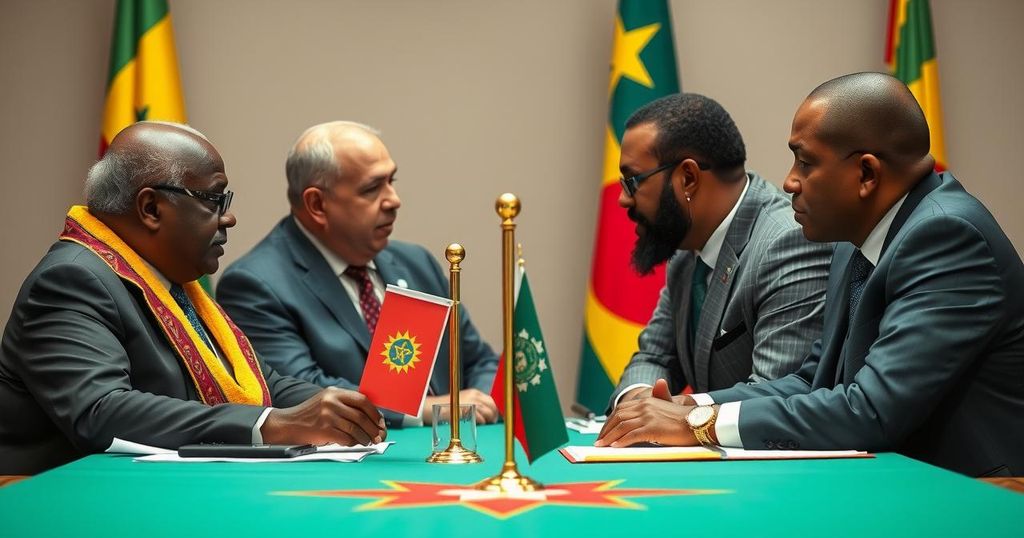Somali President Hassan Sheikh Mohamud is set to meet Ethiopian Prime Minister Abiy Ahmed in Ankara amid tensions related to a maritime agreement Ethiopia signed with Somaliland. The meeting, requested by Ethiopia, represents the first direct talks between the leaders since the agreement, criticized by Somalia as a violation of its sovereignty. Previous mediation attempts have failed, raising concerns over potential regional conflict.
Somali President Hassan Sheikh Mohamud is scheduled to meet with Ethiopian Prime Minister Abiy Ahmed in Ankara, Turkey, as confirmed by Somali officials earlier this week. The meeting was reportedly requested by Ethiopia and accepted by President Mohamud, with discussions set to begin on Wednesday. This gathering marks a significant point of dialogue, particularly following the tensions that arose from Ethiopia’s recent maritime agreement with Somaliland, which Somalia views as a breach of its sovereignty.
If the dialogue proceeds, it will be the first engagement between the two leaders since the signing of the controversial agreement on January 1, which provides Ethiopia with coastline access near the Gulf of Aden in exchange for potential recognition of Somaliland’s independence. Somalia, viewing Somaliland as an integral part of its territory, has condemned this development, asserting it as illegal. Ethiopia has countered that the agreement does not encroach upon Somalia’s sovereignty.
Somaliland, which unilaterally declared independence in 1991, continues to operate as a self-governing entity, yet it has not attained international recognition as a sovereign state. The Somali government is also awaiting the withdrawal of Ethiopian troops by the end of the month, coinciding with the expiration of the African Union Transition Mission’s mandate in Somalia.
Previous mediation efforts by Turkey to address the dispute in July and August were unsuccessful, leading to increased concerns over potential regional conflict. President Mohamud had previously declined a meeting with Prime Minister Abiy during a forum in Beijing, contingent upon Ethiopia’s withdrawal from the agreement with Somaliland. Other regional leaders, including those from Djibouti and Mauritania, as well as former Nigerian President Olusegun Obasanjo, have attempted to mediate discussions without success. The engagement between Prime Minister Abiy and President Mohamud thus stands as a critical juncture in the evolving dynamics of the Horn of Africa.
The upcoming discussions between Somali President Hassan Sheikh Mohamud and Ethiopian Prime Minister Abiy Ahmed arise against a backdrop of heightened tensions surrounding a maritime agreement signed between Ethiopia and the breakaway region of Somaliland. This agreement, which provides Ethiopia with strategic access to the Red Sea, has been rejected by Somalia, which perceives Somaliland as an integral part of its national territory. The historical context includes Somaliland’s self-declaration of independence in 1991, which remains unrecognized internationally, maintaining a fraught relationship between the Somali government and Somaliland. Previous attempts to mediate between the two leaders amidst this dispute have not yielded results, highlighting the fragile state of relations in the Horn of Africa.
In summary, the scheduled talks between President Hassan Sheikh Mohamud of Somalia and Prime Minister Abiy Ahmed of Ethiopia signify an essential effort to address the ongoing tensions stemming from Ethiopia’s agreement with Somaliland. The Somali government’s firm stance against the agreement underscores the contentious nature of sovereignty and territorial integrity in the region. As diplomatic endeavors continue, the outcomes of these discussions may hold critical implications for peace and stability in the Horn of Africa.
Original Source: www.voanews.com







